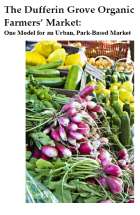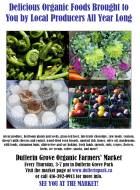
Pages in this Folder:

Related Folders:
See also Department Site Map
Publications:
Market-related videos
Comments?
For the basics, see
- Website & Privacy Policies
- How To Get Involved
- The Role of the Park
Search options:
Department Site Map
Custodians:
posted on March 30, 2011
FARMERS TAKE ON MONSANTO
Ottawa, March 30, 2011 Canadian Organic Growers (COG), Canada’s largest organic farming organization has joined 59 other farming associations, seed companies and farmers in a legal action against Monsanto to challenge the chemical giant’s patents on transgenic (genetically modified) seed.
In a law suit filed Tuesday, the Public Patent Foundation (PUBPAT), a Manhattan-based public interest law association, asks the court to consider whether Monsanto has the right to sue farmers for patent infringement if Monsanto's genetically modified seed lands on their farm. Dan Ravicher, PUBPAT’s Executive Director, said “It seems quite perverse that an organic farmer whose land is contaminated by transgenic seed could be accused of patent infringement, but Monsanto has made such accusations before and is notorious for having sued hundreds of farmers for patent infringement, so we had to act to protect the interests of our clients.”
One of the goals of the suit is to demonstrate that the biotechnology patents issued to Monsanto, the manufacturer of DDT, Agent Orange, PCBs and a host of other toxins, are not in the public interest. In 1817, U.S. Justice Story wrote that to be patentable, an invention must not be “injurious to the well-being, good policy, or sound morals of society,” and “a new invention to poison people ... is not a patentable invention.”
COG member and organic farmer Arnold Taylor said “I’m thrilled that Canadian Organic Growers and other farm organizations are not afraid to stand up to the most dominant chemical company on the planet to defend the rights of farmers. Genetically modified seeds threaten the diversity of our seed supply, farmers’ rights to save seed and jeopardize the livelihoods of farmers who could lose access to international markets.”
According to Laura Telford, National Director of Canadian Organic Growers, “Organic standards place the responsibility to produce crops free of genetic contamination on the shoulders of organic farmers. Farmers are required to take appropriate measures to ensure that their crops are not subject to contamination from neighbouring fields. With the proliferation of patents for new transgenic crops from Monsanto, including most recently, a patent for Roundup Ready herbicide tolerant alfalfa, farmers’ ability to grow organic crops is becoming increasingly difficult”.
The full legal complaint is available at:
www.pubpat.org/assets/files/seed/OSGATA-v-Monsanto-Complaint.pdf
For more information, contact: Laura Telford, National Director,Canadian Organic Growers
613 216-0742
613 298-8848 (cell)
laura@cog.ca www.cog.ca
Dan Ravicher
Executive Director
Public Patent Foundation
Benjamin N. Cardozo School of Law
55 Fifth Ave., New York, NY 10003
212 461-1902
ravicher@pubpat.org www.pubpat.org
posted on March 25, 2011
Food safety: More on those cutting boards
By: Kathleen Purvis
Published: March 24, 2011
Source: I’ll BiteDean Cliver never expected to become famous as the man who saved wooden cutting boards. But that's science for you - you never know where it's going to take you.
Working on this week's story about kitchen cleaning gave me an excuse to call lots of scientists. I always love those guys: People who spend their lives studying very small things that make you very sick are always a blast. Seriously. For instance, Doug Powell of Kansas State University founded a Web site called The Barf Blog . It's fascinating reading, if you have a strong stomach.
Powell kept telling me the trick to understanding how to keep your kitchen safe is "be the bug -- think like the bug." Hard to do for the average person, but a fun game for a rainy Saturday night.
I also talked to Cliver, a microbiologist at the University of California-Davis who is a legend in the food-safety world. Cliver is 76, but he's still studying the involvement of viruses in foodborne illness. His connection to cutting boards was an accident. In the early 1990s, it was common wisdom that modern plastic cutting boards would be much cleaner than those scratched-up old wooden cutting boards that were standard in American kitchen.
In 1993, a young woman from Turkey was at the university, looking for something to do while her husband was working on his PhD. So Cliver put her to work in the lab, running tests on wood and plastic boards to see which was most hospitable to bacteria. Everybody knew the answer, but in science, you check everything, right?
"She came back and said, 'I must be doing something wrong. I can always get the bacteria back from the plastic but I can never get them back from the wood.'" She wasn't doing anything wrong at all: It turned out that microscopic knicks and cuts on plastic boards are great places for bacteria to thrive. But even if bacteria get down into cuts and cracks on the wood, they can't live there. The chemistry of the wood kills them.
"Wood is the safety factor," Cliver told me. "If the food juice gets into wood pores, it doesn't come out alive."
Cliver is still amused that he's the go-to guy on the subject. "My principle claim to fame has been viruses." He's been working on them since 1962, and he's finally being vindicated, he says. When he started, no one wanted to consider viruses. Now, scientists are starting to recognize that viruses play an even bigger role in foodborne illness than bacteria.
"Noroviruses causes more illness than all the bacterial causes combined," he says.
It takes a scientist to sound downright tickled about that.





 Printer friendly version
Printer friendly version